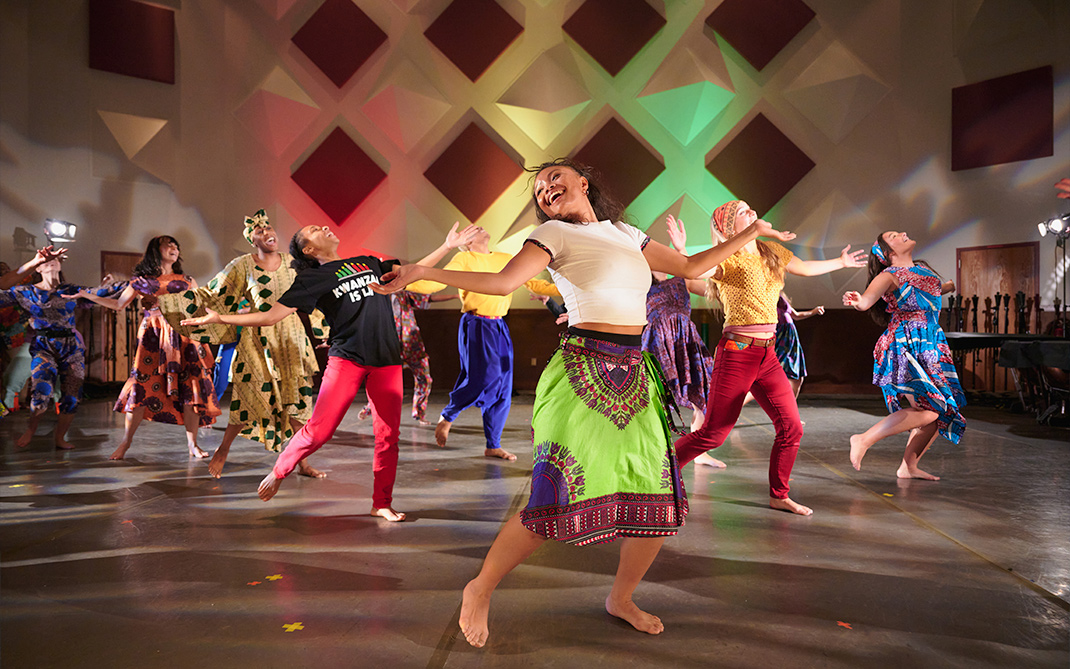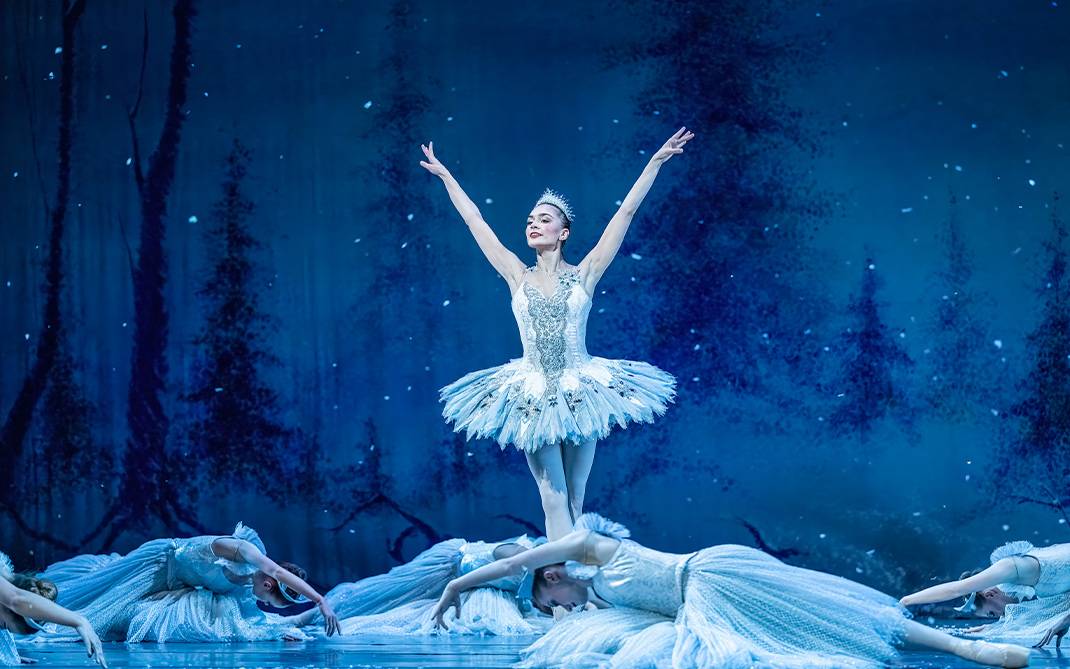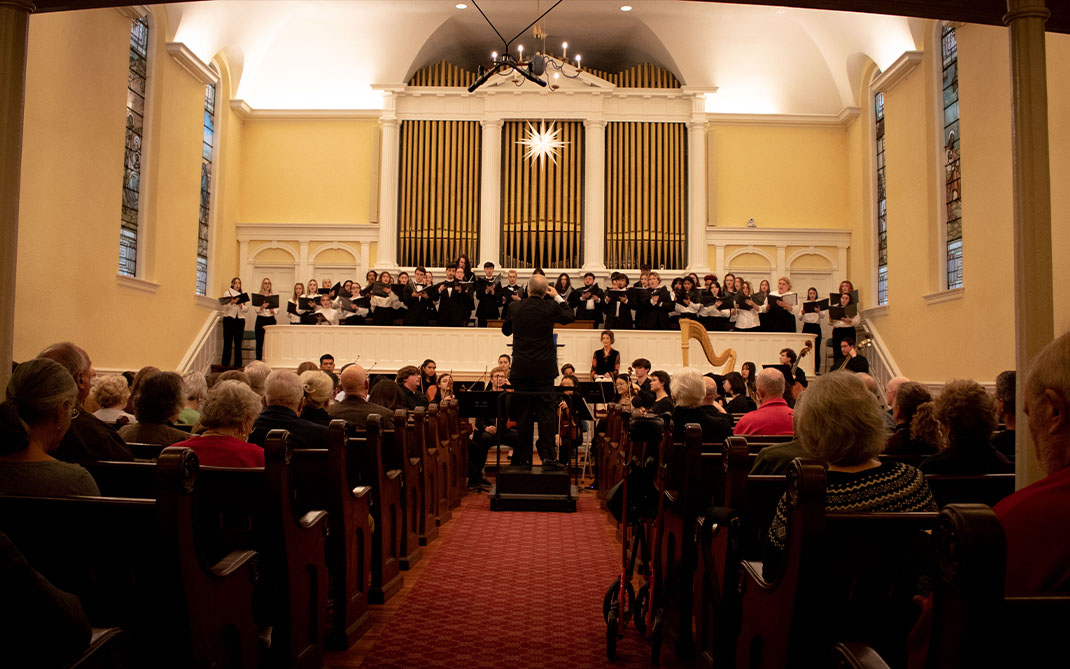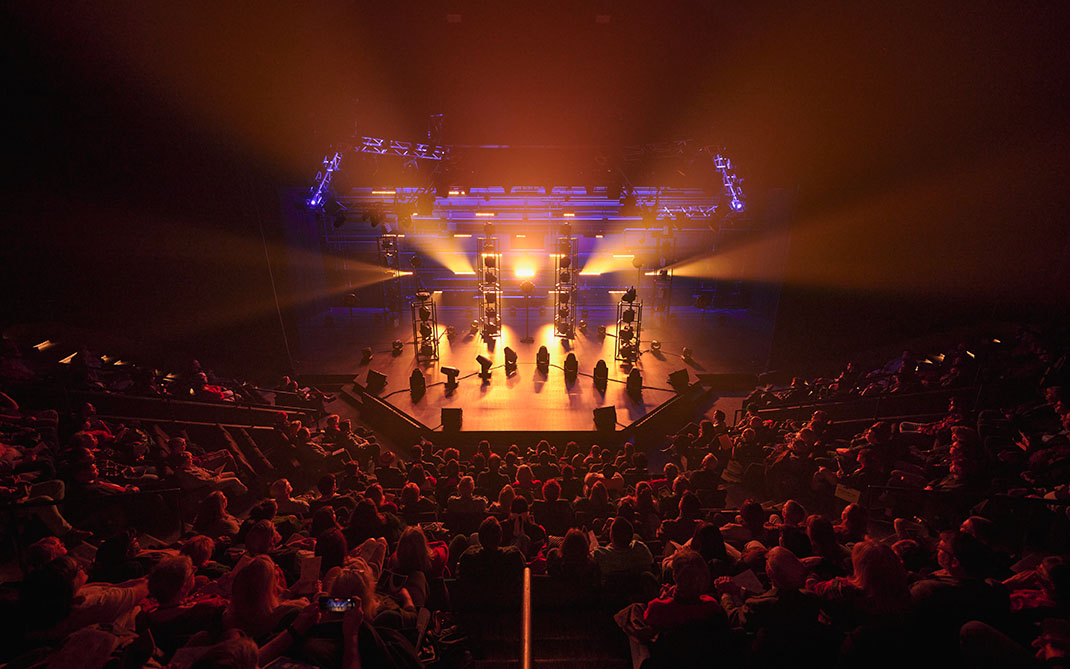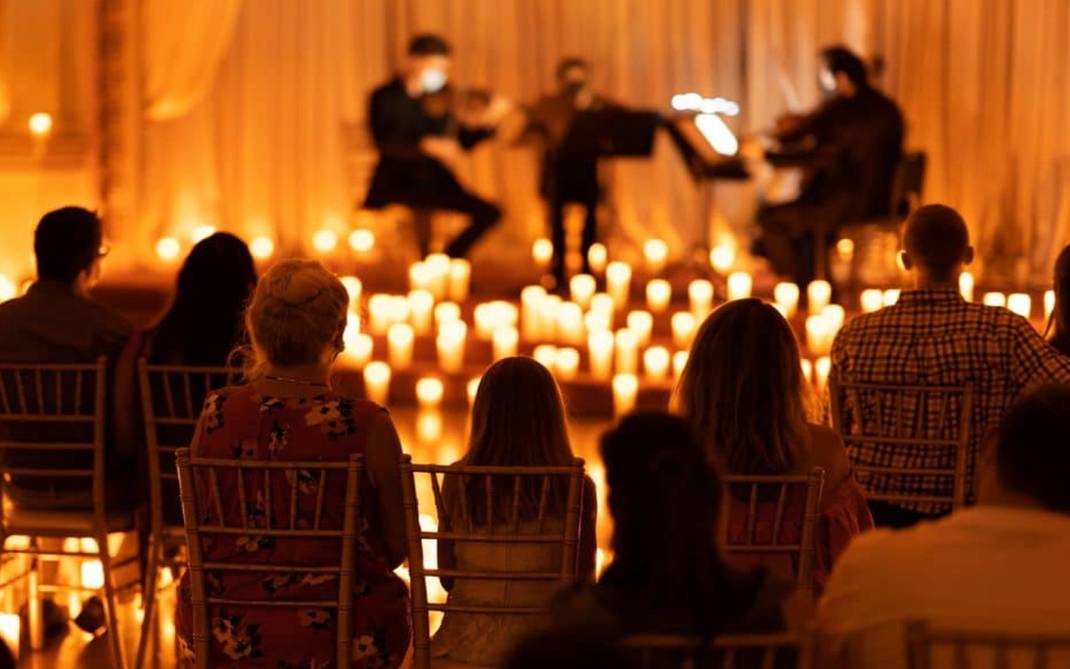Gregg Mozgala
The views and opinions expressed by speakers and presenters in connection with Art Restart are their own, and not an endorsement by the Thomas S. Kenan Institute for the Arts and the UNC School of the Arts. This interview has been edited for length and clarity.
UNCSA alumnus Gregg Mozgala, after years of performing on some of Off-Broadway’s finest stages, is enjoying a well-earned banner year. He recently completed a national tour playing the title character in “Teenage Dick,” a modern take on Shakespeare’s “Richard III” centered on the experience of a high school student with cerebral palsy, and this summer he appeared in “Richard III” itself, alongside film and theater star Danai Gurira, in the Public Theater’s revered Shakespeare in the Park season. This fall he will cap off the year with his Broadway debut in Martyna Majok’s Pulitzer Prize-winning “The Cost of Living,” reprising the leading role he performed in the play’s premiere at Manhattan Theatre Club in 2018.
Gregg can credit that success not only to his acting but also his producing skills. In 2012, determined to make disability and people with disabilities more visible on the nation’s stages, he founded The Apothetae, a New York-based theater company dedicated to the production of works that explore and illuminate the disabled experience. The Apothetae has developed several new plays and adaptations from and with both established and up-and-coming artists — disabled and non-disabled, Deaf and hearing — and it is through The Apothetae’s commissioning program that playwright Mike Lew completed “Teenage Dick.”
In this interview with Pier Carlo Talenti, Gregg describes how discovering his cultural lineage as a disabled performer led him to create a company that celebrates displaying disabled bodies and their stories with unassailable authenticity.
Choose a question below to begin exploring the interview:
- I’d like to take you back to when you were leaving the high school at UNCSA and committing to a career as an actor. You must have known you were going to face more challenges than your fellow actors of equal talent who were leaving school. How prepared were you for “the real world”?
- How do you go about having the conversation in such a way that all the issues facing artists with disabilities are confronted and dealt with head-on?
- Speaking of telling more stories, I want to hear the story of your founding The Apothetae. Was it something you always dreamed of doing, or was there an inciting event?
- What have you yourself discovered about what theater artists with disabilities require since you founded The Apothetae ten years ago? What if anything hadn’t you considered before your company’s many convenings and workshops?
- Among your collaborators in The Apothetae and also in your work outside the company are able-bodied theater artists. How do you go about establishing trust in such a collaboration? What are some guidelines you use to establish open lines of communication between disabled and non-disabled artists?
- This is proving to be a really fruitful year for you and the visibility of disabled actors in New York theater. How is this year feeling? What does it mean for you in your artistic journey?
- I like to talk about systemic change in different arts industries. Is there a “quick fix” or relatively easy fix that would make it easier for theater artists with disabilities to participate fully in the art?
- I’d love to hear about your dream artistic project. If resources were not an issue. What would it be, who would be involved, where would it take place?
Pier Carlo: I’d like to take you back to when you were leaving the high school at UNCSA and committing to a career as an actor. You must have known you were going to face more challenges than your fellow actors of equal talent who were leaving school. How prepared were you for “the real world”?
Gregg: It’s a really interesting question. Actually, I was under the assumption that I wouldn’t face those challenges. It wasn’t really in my perception at the time that my disability and my idiosyncrasies as an actor would be an obstacle because it had never been really up until that point. Theater was the place where I felt I belonged, where I found community, where I found that sense of belonging, where I could express my humanity, all those things that made theater great.
It really went into stark relief when I began auditioning for schools. Those questions came up from certain instructors about, “How do we address this? Should we bring this up? Should it be an issue? How do you have that conversation with the people behind the table?”
Pier Carlo: Were these conversations being had with you or behind your back?
Gregg: Yeah, I was involved in the conversations, thankfully.
I think it’s important to know that my own consciousness about my identity as a disabled person, although I was born with cerebral palsy and have had it my whole life, the idea that it might be an issue didn’t actually occur until my senior of high school.
I was like, 'Who am I? Who am I with this? What does it mean to start to enter the adult world, the professional world, with my cerebral palsy, being a disabled person?'
UNCSA alum Peter Hedges, who wrote “What’s Eating Gilbert Grape?,” came and did a weeklong workshop with our class. He gave us some writing prompt, some writing exercise — I can’t remember what it was specifically — but that was the first time I put thoughts and pen to paper and was like, “I’m never going to outgrow this.” Usually in late adolescence you’re growing out of bad skin and all those things that you’re riddled with during puberty and whatnot. I was like, “Who am I? Who am I with this? What does it mean to start to enter the adult world, the professional world, with my cerebral palsy, being a disabled person?”
I had no frame of reference; I had no role models; I had no one really to look up to and no markers. So that’s why I felt like, “I’m a trained actor. I’m pursuing this professionally, so I’ll just do what I always do, which is participate as much as I can to the fullest.” Even at NCSA, I never felt like any teacher didn’t know how to work with me or wasn’t willing to work with me. It wasn’t until I pursued my B.F.A. and then got out of that program and into the professional world that the obstacles became myriad and numerous.
Pier Carlo: Do you wish someone had had that discussion with you before then?
Gregg: I mean, again, the discussion was had, I would say. There may have been conversations that happened without me, but in my time at NCSA, I never felt like I didn’t belong or I wasn’t part of the ensemble or the cohort or that this lifestyle wasn’t a possibility.
Even today, 20 years on into this business, the one thing that’s constantly reinforced is that people have no idea how to have this conversation. There are still very, very few models. If anything, I’ve been working to develop those, to initiate those conversations, because no one is talking about it and how it impacts the field in any real, serious, rigorous or considered way.
Pier Carlo: So could you give me the primer? How do you go about having the conversation in such a way that all the issues facing artists with disabilities are confronted and dealt with head-on?
Gregg: Well, I think the best way to do that is through art and through theater-making. I don’t spend my days talking about disability. I think most disabled people don’t. Our days are filled with everything else, life and love and work — hopefully theater — and family, all of these things. In my case, my disability comes up when it comes up, and it’s kind of always present, but it is not the totality of who I am.
I’ve discovered that nobody really wants to talk about disability because of a fear and anxiety around it, but people will talk about art. They will talk about a piece of theater. ... And that’s the way that the issues around it can be addressed.
I don’t have the fluency of vocabulary to discuss it either. I’ve gained it through experience and engagement and having to wear multiple hats. I’ve discovered that nobody really wants to talk about disability because of a fear and anxiety around it, but people will talk about art. They will talk about a piece of theater. They will talk about a play; they will talk about a script. They will talk about the content. And that’s the way that the issues around it can be addressed.
If it’s like, “OK, I’ve got this piece of work, I’ve got this piece of art, this play, this piece of theater that I want to get produced. Who are the bodies that need to be involved in telling this story and making it happen?”, then you can get into the questions of, “What do you need to equalize that experience or make that experience accessible?”
I’m really interested in artistic or programmatic access because I feel like that’s what I want to do. You know, at the end of the day, I want to be engaged in the creative process and theater-making. Ultimately, that’s what I want. Only when I started to seriously enter into the professional sphere was my disability the major identifier. We’re in a field that is very identity-focused. Maybe it always has been but particularly so within the last 10 or 15 years. So how do I respond to that? My idea is, well, more storytellers at the end of the day. So what are my stories? Where do I come from?
It’s a very interesting thing to be othered within your own family. Yes, I have my parents’ faces and their DNA, but my physicality, my neurology is unlike anyone else’s in my entire family. If I think about it too hard, my head will explode. I’d much rather use the art as a vehicle towards understanding, towards empathy. This is what art does best. This is what theater does best. Shakespeare called it a mirror, but it’s also a doorway into experiences that are different from my own or similar to my own, where I can say, “This is who I am. This is what I’m exploring. This is my experience, and I’m going to put that onstage and share it with a wider audience.”
What I realized is I don’t know where I come from. I don’t know what my cultural lineage is as a disabled person. What I’ve come to understand or at least hypothesize is that if we do have any kind of collective lineage or heritage, it is actually rooted in performance. It is from the freak show. It’s from anatomy theater. It’s from being on display. I actually think there’s great power in that, and something about that has been lost in the second half of the 20th century and in the 21st century. I feel like I have a direct line to a long, long, long, long, long history of performance and performers, people who use their bodies, use their difference to elicit a response from an audience.
Pier Carlo: And sometimes made great wealth off it, if they weren’t overtly exploited at the same time.
Gregg: Absolutely. Yeah, it gave them a sense of community. It gave them a sense of employment. It gave them all these things. Yes, there’s a huge history of exploitation, but again that is part of my history too, and the arts, the performing arts in particular, are a great way to have those stories told and to share them with a wider audience, to increase the tapestry of human experience and broaden the culture.
Pier Carlo: Speaking of telling more stories, I want to hear the story of your founding The Apothetae. Was it something you always dreamed of doing, or was there an inciting event?
Gregg: I never wanted to make a theater — I just wanted to be an actor — but I realized as I got out of school, as I started to have contact with agents on that side of the business, I was only seeing four disabled roles, with kind of no nuance or understanding. I would be called in for people with Down syndrome, or just if the role called for disability, people would do just a blanket call. That was really illuminating early on in terms of, “Well, if I’m only going to be seen this way, then I need vehicles that will support my casting.”
I was working with certain disability-specific companies, which was great because it was an opportunity to work, and for a long time those were my only opportunities to work. The problematic issue there was suddenly I felt a real separation between ... . It was counterintuitive to my experience to date. I actually don’t hang out with disabled people very often, and that’s been true for most of my life. I always had to leave my local community to go be with other disabled people. And the work that was being presented wasn’t reflective of ... . It’s very rare to be in any kind of situation where you would have a person who is Deaf and a person who is blind or low-vision and a person on the autism spectrum and a person with cerebral palsy in one place, telling a story.
So while it was great and I was able to do Shakespeare and contemporary works and things like that, I felt like I was separated and being siloed from the larger community. I wasn’t integrated, and I feel like my experience is an integrated experience.
So how do I create works that will be more authentic towards my experience? How do I get to work with writers, directors, designers within the field that are really exciting to me that I have relationships with? The company was really born out of a willingness to tell more stories because I couldn’t identify any at the time.
You asked about an inciting incident. My freshman year of undergrad in a modern-drama class, there was an anthology of plays by an incredibly diverse group of writers: Asian American, African American, LGBTQ+. And I just realized, “Huh, there’s nobody, I don’t see any writers who are disabled here.” And I couldn’t name any writers at the time, but there was no representation within the canon that I was learning about. And I just thought, “Well, that’s interesting.” The seed for the company started back in early undergrad, I would say freshman or sophomore year. It wasn’t until 10 years, 12 years later that I was like, “OK, I feel like something needs to be done.”
I wanted to create narratives that I thought were more interesting, more nuanced, more considerate, that were rooted in actual history, whether it be from popular culture or from actual history.
Because the company I was working with, they weren’t disability-led. The artistic directors weren’t disabled themselves, and there was still this — I know this wasn’t intended — kind of a charity-based model of theater-making that I wanted to push against. I wanted to create narratives that I thought were more interesting, more nuanced, more considerate, that were rooted in actual history, whether it be from popular culture or from actual history.
The Apothetae is a place in ancient Sparta in Greece. It roughly translates to “the place of exposure.” It was the place where in ancient Sparta disabled and deformed infants were left to the elements if they didn’t fit into the very harsh Spartan worldview. I just loved the idea of playing on that double entendre of place of exposure. How do we bring these stories to light? How do we shed light into dark places? And particularly, how do we expose our bodies, our neurologies, our difference?
I’m always in relation to an audience wherever I go in my daily life, but theater allows me to put a frame around it and kind of spectacularize that attention. If I can create a piece of work where I can — for an hour and a half, two hours, whatever it may be — give people permission to look at me and allow that to happen in an artistic context, there’s something very cathartic about that for me personally. I think it actually points back to what I was saying, that I’m trying to be in conversation with a lineage that I have identified as having.
Pier Carlo: What have you yourself discovered about what theater artists with disabilities require since you founded The Apothetae ten years ago? What if anything hadn’t you considered before your company’s many convenings and workshops?
Gregg: I think by starting a company, becoming an artistic director, becoming a producer, working with these particular communities, Deaf and disabled communities, I’ve learned why — I don’t mean this in any negative sense — but I’ve learned why people don’t engage as much as they do, because there is inherent difficulty in working with these communities. The needs are different; the needs are myriad; the needs are idiosyncratic in a way that they aren’t for other populations.
But I think that’s an interesting challenge. It’s a fascinating experiment to engage in: “What’s the work I want to create? Who are the people that I need to manifest the vision behind this work? And what do I need to enable their full participation?” What I’ve learned is that if you make a commitment to telling stories of this community, you have to take into account the full breadth and scope of these communities, which is incredibly varied, incredibly intersectional.
It is a massive, massive undertaking, so the best thing that I can do is focus on one project at a time. One thing that I’ve learned to do to mitigate those issues or the difficulties is to, again, use what theater does best and collaborate with like-minded intelligent people who are committed to exploration and curiosity in an artistic setting to tell the story in the best way possible.
Pier Carlo: Among your collaborators in The Apothetae and also in your work outside the company are able-bodied theater artists. How do you go about establishing trust in such a collaboration? What are some guidelines you use to establish open lines of communication between disabled and non-disabled artists?
Gregg: One thing that I always say to people that I’m working with or people that I’m interested in working with, particularly if they’re non-disabled — or even if they’re disabled, because everybody has different levels of experience; everyone has different entry points to the community — is, “Say everything you feel you shouldn’t say, and ask everything you feel you shouldn’t ask.” Particularly to non-disabled collaborators, particularly writers, because if I pitch them an idea or give somebody a commission, I don’t want them to feel like they can’t express themselves fully or follow their impulses to the fullest extent. That can always be course-corrected, if necessary. That’s where the collaboration and the partnership come in. That’s where I work to build trust of, “You’re the artist; I trust you. Let’s develop the piece together. If there’s anything that needs to be adjusted or changed or doesn’t ring true, that’s what we’re here for. That’s what your other collaborators are here for.”
Working with Deaf and disabled artists, I’m really interested in finding works where there’s seamless integration between the person’s disability and the character. ... You are the absolute right person for this as you are, so bring everything you possibly can, which includes any idiosyncrasies or issues related to your disability.
Working with Deaf and disabled artists, I’m really interested in finding works where there’s seamless integration between the person’s disability and the character. I want to ensure to people that everything that you are as an individual is right for this particular project. You can bring everything you have to the role, to the process, to the part, and you don’t need to feel like you are less than or don’t have anything to offer. You are the absolute right person for this as you are, so bring everything you possibly can, which includes any idiosyncrasies or issues related to your disability.
I think just giving somebody the permission to do that can go a long way. I know that’s important for me. That’s something that I’ve had to deal with as an actor myself, realizing that every character I ever play is going to have cerebral palsy. That is the essential part of my humanity. It is a differentiating factor in who I am as a person and as a character. That is who I am as a human being, so don’t try and hide it. Don’t try and shy away from it. How I move is how I move. How I hold myself is how I hold myself. It’s going to affect how I think, how I talk, how I breathe, how I love, how I interact.
I have to be brave and courageous in my own work and in my own practice to encourage that, and I want to encourage others to bring that as well.
Pier Carlo: This is proving to be a really fruitful year for you and the visibility of disabled actors in New York theater. You’re currently in “Richard III” in the Park, and you’ll be on Broadway this fall, co-starring alongside another disabled actor. How is this year feeling? What does it mean for you in your artistic journey?
Gregg: Yeah, I’m in a good place right now. I mean, I’m working. I’m working as an actor. [He laughs.] That’s always a good place to be.
Yesterday was the Tonys. I don’t know if there’s an actor alive that hasn’t practiced a Tony speech or an Oscar speech or some award speech. I have delusions of fame, and I would love that in some sense. But I think at the end of the day, the longer I’m in this game, the longer I’m in this field, the goal is to always just keep working, just keep learning, operate from a posture of humbleness and gratitude.
Every time I get in a room, I realize I’m part of a much larger machine. I am just one person within a much larger ecosystem. I am an actor, and I might be the person who’s more visible for an audience, but there’s a whole group of people who make the lights go and the sound go and who put these things together. And there’s administration. I want to understand my part in the storytelling and in that artistic process and hopefully not take myself too seriously.
Right now, I’m just trying to enjoy the ride because yes, I am working. I have the great benefit of being in Shakespeare in the Park. I am hopefully, barring any sort of flareups of COVID or plague or monkeypox or whatever it might be, I’m going to be making my Broadway debut. I don’t know what’s going to come after that. I’m just trying to stay focused on one gig at one show one rehearsal at a time.
We’ll see what happens. I feel like I’ve been doing this long enough to know that if you get into a space where you think, “This is going to be the thing! This is going to be the thing!” you never know what’s what is going to be the thing that might lead to work or the next gig. I want to enjoy the work while I have it. And I’m not going to quit my day job, not yet anyway.
I’m just fortunate to have the work when I have it. I’ve worked really hard to get here. I want to continue to work hard and have some fun along the way because at the end of the day, as difficult as the profession can be, as hard as the work can be, there’s still no other job like it. It’s still getting in a rehearsal room and hanging out with people who are smart and intelligent and attractive in all kinds of ways. It’s still so, so exciting, and it’s a real privilege to be able to do this.
Pier Carlo: I like to talk about systemic change in different arts industries. Is there a “quick fix” or relatively easy fix that would make it easier for theater artists with disabilities to participate fully in the art?
Gregg: I don’t know if there is a quick fix to greater inclusion. The answer to me is always, again, make more art. Make more art that will allow people to be included, whether that’s roles that are specifically for disabled actors or people thinking outside the box and saying, “Well, why couldn’t this person play this role?”
I just think we need to — we as disabled people, as Deaf and disabled talent — need to be generative. We need to make the art. We need to demand to be places we’re not. We need to make our experiences known and share with a wider audience. Again, that’s what theater does. We need to make our stories visible. We need to make our histories visible. We need to make ourselves visible. Theater, playwriting, storytelling allows that to happen. I think the more you see it, the easier it will come.
What is ahead is unknown, but it’s a very exciting time. I’m excited to be, if I may say, at the forefront of it and to be able to just get on the stage and do my thing. At the end of the day, that’s all I want. That’s what I went to school for. This is my vocation, and this is what I want to do.
But again, think of how long it’s taken communities of color, trans, LGBTQIA+ communities to reach a place where you’re seeing more than just one story represented or one perspective represented. It’s taken decades and decades and decades. I feel like we are just at the start of something. Strides are being made, but we still have a long way to go. What is ahead is unknown, but it’s a very exciting time. I’m excited to be, if I may say, at the forefront of it and to be able to just get on the stage and do my thing. At the end of the day, that’s all I want. That’s what I went to school for. This is my vocation, and this is what I want to do.
Pier Carlo: I’d love to hear about your dream artistic project. If resources were not an issue. What would it be, who would be involved, where would it take place?
Gregg: Oh man, a dream artistic project! Well, so my roommate at NCSA at the time, his name was Clay McLeod Chapman, an incredible guy. He’s a successful writer of books, comic books, films, and he was a huge horror buff. He loved the horror genre. He introduced me to all kinds of literature but that world in particular.
But one film — we did a screening in our dorm room — that he showed me was Todd Browning’s “Freaks,” which is film about a family, a circus, a group of sideshow performers, which was produced by MGM in the early ’30s, pre-Code, directed by Todd Browning, who did Bela Lugosi’s “Dracula.” He was a hugely successful director. The film was an unmitigated flop and disaster when it first came out, but it’s universally recognized now as one of the best horror films ever made.
My dream project would be to make a movie about the making of Todd Browning’s “Freaks.” That’s where my mind is now. It’s a project I’ve had in mind for a long time and a project the seed for which was planted at North Carolina School of the Arts during my senior year of high school. So thank you, Clay. Thank you, NCSA, for that.
I would love to see that kind of story developed and brought to the big screen because it’s a movie about making movies but it’s also a real story from history and it’s a project that can support the casting of multiple people, multiple bodies. It’s a real slice of movie history and, I think, disability history that I would love to see manifest.
It might take me 20 years, but I’ll get there. I’ve been thinking about it, I guess, since I was 17, so if it takes another 17 years, it would be worth it.
July 18, 2022
